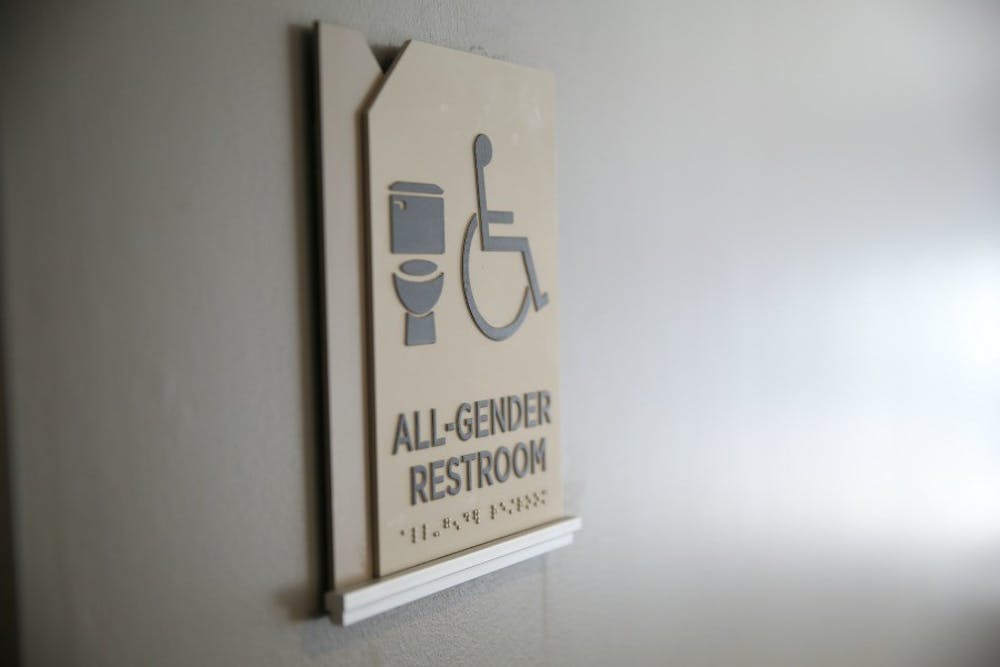By Laura Fitzgerald, Senior Staff Writer
Miami University's private restrooms are being relabeled as all-gender restrooms to give students of all genders, and especially transgender students, a safe place to use the restroom.
Four private restrooms were relabeled as all-gender in Armstrong and one in the Rec on Nov. 4 and 5. All-gender restrooms are single-stall, or "private," restrooms that are available to all genders, and are specifically labeled as "all-gender" or "gender-inclusive".
Assistant Director and Coordinator of GLBTQ Services Shevonne Nelson said she hopes to have all single-stall restrooms relabeled as all-gender restrooms by fall of 2016.
Single-stall restrooms are being relabeled in phases. The current phase is Armstrong and the Rec Center. Large public spaces, like the Health Services Center and the Hanna House are the next phase, followed by academic buildings and, finally, the residence halls.
Creating all-gender restrooms in these and all future locations does not actually require the construction of any new restrooms. It requires the installment of new signs on pre-existing single-stall restrooms, Nelson said.
Colleen Bunn, assistant director of the Office of Resident Life, said this is part of a larger initiative that includes gender-inclusive housing to make Miami more accessible to students of all genders and gender identities.
"As a university that is dedicated to diversity inclusion, finding and creating spaces for our students that honor all of their identities is really important," Bunn said.
There are various additional costs with some gender-inclusive housing options.
There are currently single-stall restrooms in all the new and newly renovated residence halls on campus, but these are still yet to be labeled as all-gender restrooms, Bunn said.
Nelson said this especially benefits transgender students and students of differing gender identities because it creates a safe space for students to use the restroom.
"It is incredibly important for trans bodies to have a place where they can safely and affirmatively use the restroom," Nelson said.
Enjoy what you're reading?
Signup for our newsletter
Students who have different gender identities often feel unwelcome in gendered bathrooms because they do not look like their biological sex, Nelson said.
Nelson said this sometimes escalates to verbal abuse, and in extreme cases, physical abuse, although Nelson said she has not heard of any cases reported at Miami this year.
First-year Alexx Apicella is a transgender student who identifies as male. Apicella said he has had uncomfortable experiences in male restrooms.
"You walk in and it doesn't look like you belong there, so everybody stares," Apicella said. "Or they confront you directly, [and] will ask you what you're doing here and quest that you leave the room immediately."
Nelson said there are approximately 70 single-stall restrooms on campus. These however may be difficult to find, such as single-stall restrooms attached to an office, or they may not have a sign specifically labeling it as all-gender.
With limited access to all-gender bathrooms, transgender students and students with non-conforming gender identities face health concerns because they may not go to the bathroom for the majority of the day, leading to increased risk of kidney infections and urinary tract infections, Nelson said.
Nelson said some students may also stop eating and drinking so they do not have to use the restroom.
The unavailability of a restroom may also hinder students' focus in class, as they may focus instead on the need to relieve themselves, Nelson said.
Apicella said while he does not think he is not being deliberately discriminated against, a lack of all-gender restrooms damages the transgender community as he feels there is not a safe space for him to meet a basic human need.
"When you have the ability to make a change for the better and yet you do not do so, it's damaging to the community," Apicella said. "It makes you feel like, 'I don't belong here because I can't find a restroom, I can't find representation.'"
Apicella said many people don't realize the broader implications of something as basic as using the restroom.
"If it is such a small thing that people think it is, then just change it," Apicella said. "You're not doing any harm by changing it and it will do a lot more good."




